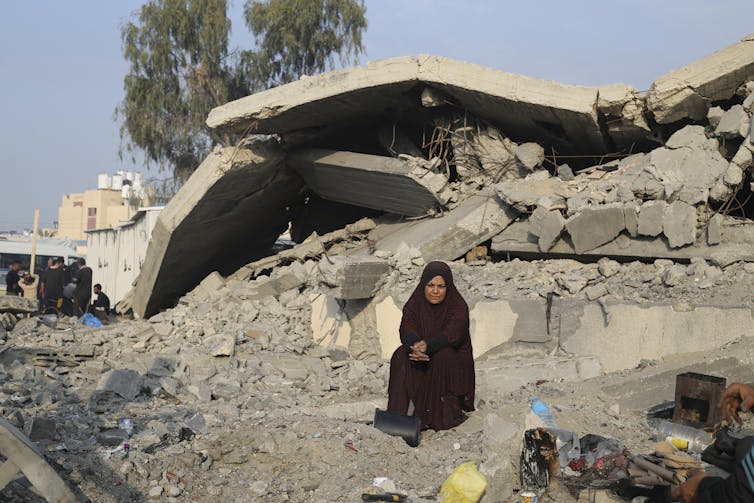National Indigenous Peoples Day — a day intended to recognize and celebrate the cultures and contributions of the First Nations, Inuit, and Métis peoples — is almost here.
Some of the original calls for this day from the National Indian Brotherhood — now the Assembly of First Nations — were for a “National Indigenous Solidarity day.” As people gather to celebrate, it’s vital that this celebration is connected to the recognition of ongoing settler colonial violence and commitments to solidarity.
Limiting who public space is for and how it can be used is central to settler colonialism both in Canada and other settler colonial places. The process involves the violent removal of people from encampments.
Securing these spaces is at the expense of some people and works to perpetuate and make invisible what German philosopher Friedrich Engels called social murder (a concept that has re-emerged amid many issues, including COVID-19) — an unnatural death that occurs due to social, political or economic oppression.
Act I: Criminalizing poverty
This winter, in Alberta and around Canada, there was a dedicated effort to destroy encampments set up by unhoused people and to criminalize poverty.
The Edmonton police, in particular, have been active in destroying encampments and removing people’s belongings, justifying their actions by citing concern for the public’s safety. However, as many have pointed out, these concerns don’t take into account the lived experiences of those in encampments and often exacerbate the challenges people might already be facing.
In this act, we see social murder through the increased deaths of people who were homeless throughout the winter. Settler colonial policies that prioritize private property, criminalize drug use, oppose harm reduction and commodify housing result in this type of social murder.

Act II: Criminalizing dissent
More recently, the Edmonton Police Service and Calgary Police Service — as well as the University of Alberta and University of Calgary administrations — have come under intense scrutiny for violently dismantling solidarity encampments on campuses.
The protesters in these encampments are demanding universities disclose their investments and divest of any that fund genocide and Israeli settler colonialism in Palestine. Police responses to peaceful and legal protests involved baton-wielding police officers firing tear gas and pepper-spray balls at demonstrators.
These tactics were similar to the actions of police who destroyed encampments in the winter. The rhetoric of safety was again deployed, tents and items were confiscated and the ability to take up space was curtailed.
Read more: Encampment sweeps in Edmonton are yet another example of settler colonialism
In this act, we see police and university administrators colluding to remove encampments and silence questions of complicity in the ongoing Israeli military assault on Palestinians.

Act III: Destroying homes
The concept of domicide is crucial to understanding how these two examples of encampment destruction are symptoms of settler colonialism and how police continue to maintain their colonial foundations.
Housing scholar and activist Andrew Crosby uses domicide — the destruction of homes — to examine how settler colonialism is founded on the destruction of Indigenous homes and lives.
Considering domicide together with expansive Indigenous definitions of homelessness that include people, families and communities isolated from their relationships to land, water, place, family, kin, each other, animals, cultures, languages and identities, we can see the various ways the Canadian state produces homelessness and often death for Indigenous people. That includes through the reserve system, fighting land claims and ignoring or violently shutting down land defence protests.
In Palestine, settler colonial violence has involved the destruction of homes since the onset of the Nakba, and now through the ongoing destruction of Gaza, the displacement of two million people and the deaths of more than 35,000 Palestinians.
Israeli settler colonialism enacts social murder by evicting Palestinians from their land, destroying their homes and continually expelling Palestinians who survive attacks from each place they are forced to relocate to.

Read more: Does the destruction of homes in Gaza constitute genocide?
Struggles are connected
Settler colonial violence through eviction and social murder in Canada and in Palestine are entwined.
Indigenous activist Mike Krebs and American researcher Dana Olwan explain that both Israeli and Canadian settler colonialism are defined by theft of land and removal of Indigenous people from that land, but also that acts of settler colonialism in disparate places work to hold one another up.
Krebs also argues that Canada’s support for Israel is longstanding and rooted in practices of settler colonialism.
The tactics used to remove encampments during the winter in Alberta were used again and made more violent — via the use of rubber bullets, tear gas and pepper spray — against encampments on university campuses.
Tactics similar to those used by the Israeli military are used against Indigenous land defenders, protesters and in everyday policing practices in Canada.
On National Indigenous Peoples Day, it’s important for all Canadians to recognize the ongoing efforts to eliminate and silence those calling out Israeli settler colonial violence — and the complicity of Canada’s public institutions.

